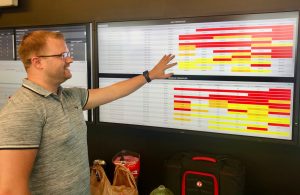Search Contract Jobs*
Hello!
You’re now leaving the Expedia Group careers site and will be directed to our supplier partner’s website to explore and apply for contract job opportunities with Expedia Group. The website is operated by Expedia Group’s employment partner.
*currently only offered in USA & UK
Jobs
Search Expedia Group Jobs
How Expedia Group teams help travelers deal with natural disasters (and more)
This September, Hurricane Florence hit the east coast of the US with wind speeds of 85 miles per hour (137 km/h). It went on to cause widespread flooding, large-scale power outages, and evacuations of entire neighborhoods.
It not only wreaked havoc on the coast – it also created turmoil for our customers in the region, and made many more rethink their planned trips.
Something’s happening, always
With hurricane coverage top of the news and thousands of people ready to call about changing their travel plans, our global command center team was at full alert, ready to help our customers — and our agents — make the best of a bad situation.
Split between Bellevue, Prague and Gurgaon, the team monitors large-scale events that could impact our customers around the clock.
As Florence grew and drew more news coverage, the team was already monitoring the developing storm for a while, along with a damaged airport bridge in Osaka, Japan, several other developing storms in the Atlantic and Pacific, and Typhoon Mangkut.
Keeping agents and customers in the loop
The first order of business is to create impact reports, because not every disaster that’s big in the news is big for Expedia Group. “It always depends on the area and how many customers we have there or going there,” said Geneva McMahon, director of the global command center. “Last year, Hurricane Harvey was big but low impact for us. Irma on the other hand almost brought us down to our knees.”
With the impact assessed, it’s time to figure out how our brands and suppliers want to handle the situation and get information to our agents as quickly as possible. Typically, our brands talk to market managers in the affected areas and then issue “flex policies” that allow customers to rebook their travel or cancel at no cost. Airlines are often the fastest to react — they really know what the weather is doing.
Getting our agents up-to-date is key for keeping call queues short. At the same time, the team is trying to communicate directly with our customers via email, text alerts, and warning notices on our websites.
It’s a team effort
Monitoring a potential crisis and getting information out quickly is an important step, but only one in a series of actions we need to take to make a bad — or potentially bad — travel experience less painful for our customers.
During Hurricane Florence, initial coverage mainly showed long lines of cars leaving North Carolina’s Outer Banks due to mandatory evacuation orders. Quite a few people in those cars were customers that had to leave their hotel and find another place to stay.
That’s a job for our relocation team in London. This team will help customers directly affected by a crisis event find alternative accommodations.
On queue: managing call center wait times
As Hurricane Florence approached the coast, the crisis team got to work collecting policies, informing agents and sending out alerts.
At the same time, several monitors in our command center took on a slightly ominous reddish hue. They provide a detailed look at what’s happening in our call centers, from how many people are waiting in queue, to how many called but hung up before getting to an agent (the abandon percentage), up to how many agents are on breaks or in team meetings.
This is the domain of the real-time team which monitors the performance of our call centers and takes action if customers have to wait too long. “We declare what’s the impact on the business because of this event,” said Houston Chatham, manager of the real-time team. “We look at the last six 30-minute intervals and see how the performance for the service group or brand is trending. If it hits a certain level, we declare a severity code and put some pre-defined actions in place.”
How did we do?
Hurricane Florence got a lot of media attention but turned out to be “only” moderate impact for our business.
Thanks to all the actions taken both in- and outside of Global Customer Operations (GCO), we highly reduced the hurricane’s impact on our customers. The Travelocity Brand and Orbitz Brand were most affected but fared much better due to the proactive mitigation management.

Houston, we got a problem! Houston Chatham, manager of the Real Time team takes a look at the screen showing call center wait times as Hurricane Florence approaches.
After an event is always before an event. Currently, the team is tracking seven new active events across the world and is taking a hard look at the response to Florence. At the same time, we are actively working on automating certain customer pain points like flight cancel and rebook.
Ultimately, one can imagine an AI-powered future in which we can automatically contact, reroute or rebook customers affected by a crisis event.
But that’s still a way off. Until then, it’s good to know we are ready when disaster strikes.
